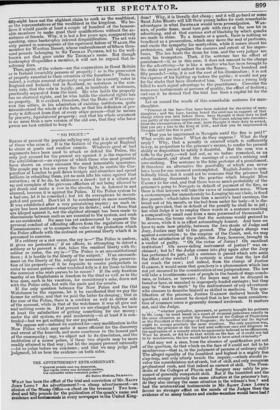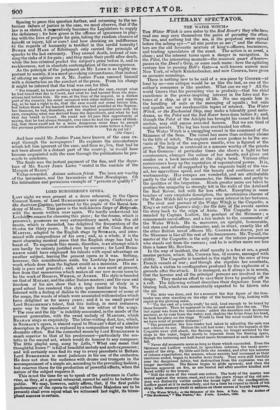THE ADVERTISEMENT EXTRAORDINARY.
" quantte putatis esse vos dementies, Qui capita vestra non dubitatis credere, Cui caicandos nemo commisit pedes 1" Er Sutere Medieus, PHA:WRVS.
p had the aristocratical testimonials in Mr. SAINT JOHN Lorrn's Bred and fifty pounds for the publication of the quack's name and favour no stronger effect on the minds of the Judges than the zesidence and testimonials in every newspaper in the United King- evidence of so many tinkers and cinder-wenches would have had? WHAT has been the effect of the trial and conviction of Mr. SAINT Joni.; LONG ? An advertisement !—a cheap advertisement—an elusion of the Stam Office—a cheat on the revenue ! Two hun- Then, again, of the voters—are the corporators in Great Britain for the advertising—he is like a martyr who has been brought to empiric ?
petty is different from that of every other person—that he means "Prisoner at the bar—You have been indicted for the crime of man- by property, legislatorial property; and that his whole argument slaughter ;ich was laid before them, have thought it their duty to find
and the Jury, having heard the evidence in support of that you guilty of the crime imputed to you. The Court, taking into consider- that you pay a fine to the King of 2501., and that you be imprisoned in Newgate until the fine is paid."
" That you be imprisoned in Newgate until the fine is paid !" What words are these? What do they suppose ? What do they imply ? Why, that a penalty is exacted which is sufficiently heavy, in proportion to the prisoner's means, to render his present ability or disposition to satisfy it doubtful. But the sum was a trifle to the party,—well laid out, as we before remarked, as an advertisement, and about the earnings of a week's rubbing and sore-making. The sentence is the false pretence of a punishment. It threatens an alternative the possibility of which can never have been for one moment contemplated. English Justice is sym- bolically blind, but it could not be unaware that the prisoner had been making thousands by the practice which brought Miss CASHIN to her end, and that there was as much probability of the prisoner's going to Newgate in default of payment of the fine, as there is that lawyers will take the views of common sense. When a costermonger, for immoderately be-Longing his ass'shide, is fined five pounds —which takes from him a month's hard earnings, the bread out of his mouth, or the bed from under his body—it is dis- creetly provided, that in default of the penalty he shall lie in jail; but what fudge it is to employ these words in a sentence exacting a comparatively small sum from a man possessed of thousands !
However, the terms show that the sentence would pretend to be severe, while it is in effect astoundingly lenient. And here we have to note how pitiably, between the two stools of Judge and Jury, Justice may fall to the ground. The Judge's charge was against a conviction ; to the surprise of the Court, and, we may add, the satisfaction of the public, the Jury, however, brought in a verdict of guilty. " Oh the virtue of Juries ! Oh excellent institution! Oh never-failing instrument of justice!" was ex- claimed ; but lo the Judge comes into play again after the Jury has performed its part, and a sentence is passed which sets aside the effect of the verdict! It certainly is clear that the law did not reach the case ; and indeed, from the charge of Justice GARROW, it would seem that quackery is a phenomenon which has not yet occurred to the consideration of our jurisprudence. The law will take a troublesome care of people in the hands of stage-coach- men, or bakers, or brewers ; the lieges may not be drugged in bread or beer, or smashed in improperly-loaded carriages ; but they may be "done to death" by the maltreatment of any ad venturer who chooses to describe himself as skilled in medicine. The qua- lification of the prisoner, Justice GARROW declared beside the question ; and it cannot be denied that in law the main considera- tion of common sense is generally deemed irrelevant. It matters not, said the Judge, . . . . "whether prejudice, ignorance, or poverty brought his patients to Mr. Long : he must stand in a court of criminaljudicature exactly in
the same situation as would the President of the College of Physicians
or the President of the College of Surgeons; the humblest and the highest ought to occupy precisely the same situation. The only question was,
whether the prisoner at the bar had used sufficient care and diligence in the application of a remedy which he apparently believed to be efficacious. Were he drunk, or did he do that which on the face of it could not fail to be mischievous, the law would hold him to have acted criminally."
And may not a man, from the absence of qualification put out of the question, do that which on the face of it could not fail to be mischievous—that is, in the judgment of persons of ordinary skill? The alleged equality of the humblest and highest is a mighty fine clap-trap, and only utterly beside the inquiry,—which should in- volve the consideration not of rank, but of skill, and only recognize professional rank, and that indeed as earnest of skill. The Presi- dents of the Colleges of Physic and Surgery may safely be pre- sumed of generally competent skill. But if the humblest and the highest occupy precisely the same situation at the prisoner's bar, do they also occupy the same situation in the witness's box ? and Sparing to press this question further, and returning to the no- tonous failure of justice in the case, we must observe, that if the law is as stated, it imperatively becomes the Legislature to supply the deficiency ; for how grave is the offence of ignorance in play- ing with the lives of people for gain, taking the random chances of benefit or injury, kill or cure ! and how shocking an indifference . to the regards of humanity is testified in this sordid temerity ! BURKE and HARE of Edinburgh only carried the principle of qua. cks to the last extremity. They caused death, instead of run- ning the risks of it for gain ; and they made their profit after death, while the less criminal pocket the subject's price before it, and in recklessness, not in absolute contemplation of the consequences. As the principle of the judgment on Mr. Loric. is so highly im- portant to society, it is a most provoking circumstance, that instead of uttering an opinion on it, Mr. Justice PARK amused himself with a dissertation on the conduct of the press. From his charge it might he inferred that the trial was one for libeL " For himself, be knew nothing whatever about the case, except what he had heard that day in Court, and what he had learned from the depo- sitions laid before him.. He was, at the time of the ioquest, in a distant part of the country, his mind occupied with other matters ; and suppos• trig, as he had a right to do, that the case would not come before him, but before those of his learned brethren who had presided at the Septem- ber Sessions, he had, therefore, not the slightest acquaintance with the case, excepting what was derived from the depositions, and what he had that day heard in Court. He could not let pass that opportunity of saying, that he had always thought, ever since he had the power of think- ing, that there could not be a more dangerous error than to permit the previous publication of evidence afterwards to come before a Jury." 'fol de rol lol 1 (Da Capo.) And how could Mr. Justice PARK have known of the case ex- cept through the newspapers ? He explains the circumstance which left him ignorant of the case, and thus implies, that had he not been absent in a distant part of the country, he would have become acquainted with the case through the publications he pro- ceeds to condemn.
The finale was the instant payment of the fine, and the depar- ture of Mr. SAINT JOHN LONG " seated in the curricle of the Marquis of SLIGO." Virtue rewarded. Asinus asinum fricat. The laws are worthy of the lawmakers, and the lawmakers of their Asculapias. Oh the infatuation and pernicious example of "persons of quality ! "



























 Previous page
Previous page